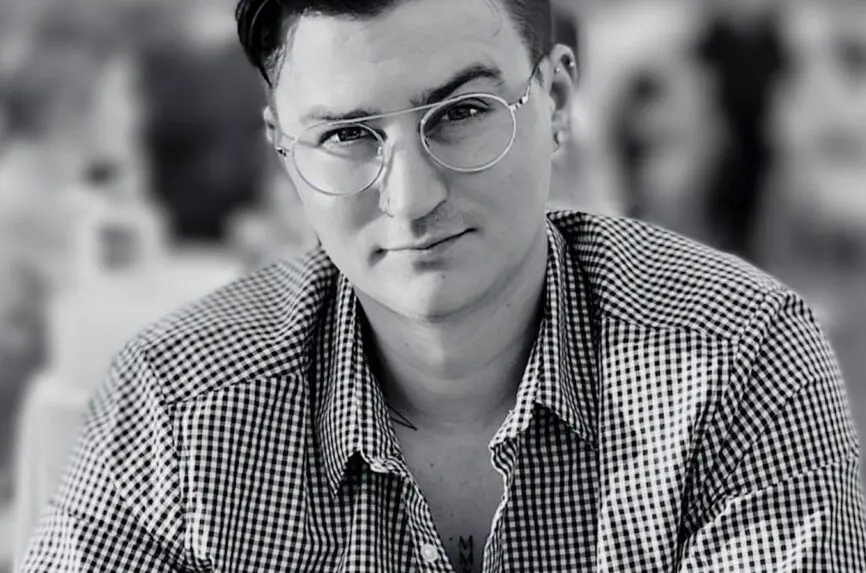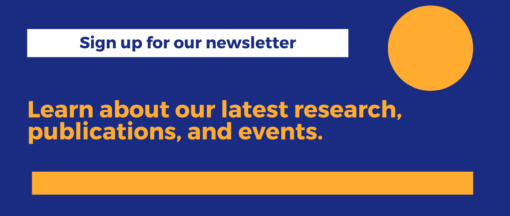Hastings Center News
Bioethics Chats: Joel Michael Reynolds
Joel Michael Reynolds, PhD, MA, is an associate professor of philosophy and disability studies at Georgetown University and School of Medicine and a Hastings Center Fellow. An internationally recognized expert on disability ethics, he launched The Journal of Philosophy of Disability in 2020 and is author or editor of four books—the latest is The Art of Flourishing: Conversations on Disability—and two more in press. (See Joel’s website for more details.) His friends at The Hastings Center for Bioethics are proud that he began his distinguished career not long ago as a postdoc here. In his conversation with Vardit Ravitsky, he revealed one thing about disability ethics that everybody should know, but a lot of people don’t. Their conversation has been edited for clarity.
Vardit: What do you think are the most important topics in disability ethics right now?
Joel: There are three really hot topics right now. The first is disability and AI, especially with regard to the incorporation of AI in health care and the labor force and questions concerning how to reduce the risks and increase the potential benefits for disabled people.
The second topic is disability and health disparities. Since the formal recognition of disabled people as a health disparity population by the National Institutes of Health in September 2023, there is new funding and a renewed interest in trying to understand and mitigate the health disparities that disabled people face (though things are up in the air due to the current administration).
And the third issue is disability in relation to pandemic and emergency preparedness. What we went through with Covid-19 was a nightmare in many respects, but there are so many lessons to be learned if we listen to disabled people so that we are in a better position to respond to emergencies like Covid in the future.
Vardit: When you say, “if we listen to disabled people, we will do a better job of in pandemic preparedness,” what should we be listening for?
Joel: One of the big insights from disabled people who worked on the Covid-19 response and also critiqued the responses is that our current infrastructure is not set up to provide everyone with the sorts of supports they need. When an emergency strikes, you can think about this in terms of the built environment. If you do not have things generally accessible in day-to-day life, their lack of accessibility becomes a question of life and death when there is an emergency, whether it’s getting people out of a building or making sure that communication regarding emergencies goes across languages and various communication modalities. So many insights come from listening to disabled communities regarding what went wrong in the past and what could go better. And this will be an improvement for everybody, not just disabled people.
Vardit: Tell me about the journal that you recently launched and why you felt that there was a need for it.
Joel: I founded The Journal of Philosophy of Disability in 2020 because there was no space for philosophers of disability to engage in research in the field on their own terms. Until this journal came along, to publish on disability in a philosophy journal meant that one often had to engage with scholars and deal with reviewers and editors who didn’t know anything about research on disability in philosophy, not to mention research on disability across the humanities, social sciences, and life sciences. And such a situation, of course, undermines the progress and quality of research. I’m extremely happy and proud that the journal exists, that it is open access without requiring payment from authors, and that it has been successful, and I’m eager for it to be a part of the continued growth—quite explosive in recent years, at least from where I’m sitting—of the field of philosophy of disability.
Vardit: I’m going to throw you a curveball, a question that we didn’t agree on ahead of time. If there’s one thing that you want to tell the general public about disability ethics that everybody should know but a lot of people don’t, what would that be?
Joel: That one thing would be that you do not know what it is like to be disabled. You can’t imagine or hypothesize yourself into understanding what it means to be blind if you’re sighted or what it means to use certain mobility devices if you’re ambulatory. People mistakenly think that disability just means, oh, I minus this thing from my experience. And that’s not actually how disability works. You know what disability is like from experiencing it. And this is why it’s so crucial to engage in research and listen to the testimony and be in community with disabled people.
Vardit: You’re a prolific writer, a very productive scholar. But what do you do to chill?
Joel: The main thing I do for fun is hang out with my adorable miniature dachshund, Schnerp, as well as my partner. We go on walks, we watch movies, the three of us. We love DC. It’s a wonderful city to explore for food, for music, for everything.
Vardit: What are you reading right now for fun?
Joel: I’m finally reading Dune, and I’m really enjoying it.
Vardit: Aren’t there references to disability in Dune?
Joel: Yes, there’s disability and thinking about ability and disability shot through the entire story. Every story is a disability story.
Vardit: So, I guess you’re not only reading it for fun.
Joel: Nope, everything is also work.
Vardit: Ha! Like you, I find connections to my scholarship in everything I read and do.
Joel: Indeed, indeed!
Vardit: What piece of advice would you give junior scholars who aspire to have a career in bioethics?
Joel: Remember that research is a social endeavor. Your connections, your networks, your friendships with your colleagues, all these will prove to be the single most important aspect of your career and the thing that furthers your research. So, build those networks and communities and pay close attention to the people around you. Care for them, read their work, and just be as good of a colleague and research citizen as you possibly can.
Vardit: I totally agree with you, Joel, and I think that the best part of becoming a more senior scholar is that you have the liberty and the privilege of choosing carefully and intentionally who you want to work with. And at some point, you can’t even distinguish colleagues from friends. And then your research is really a party.
Joel: Yeah, research is a party. Love it.
Vardit: Me too. Thank you, Joel.

